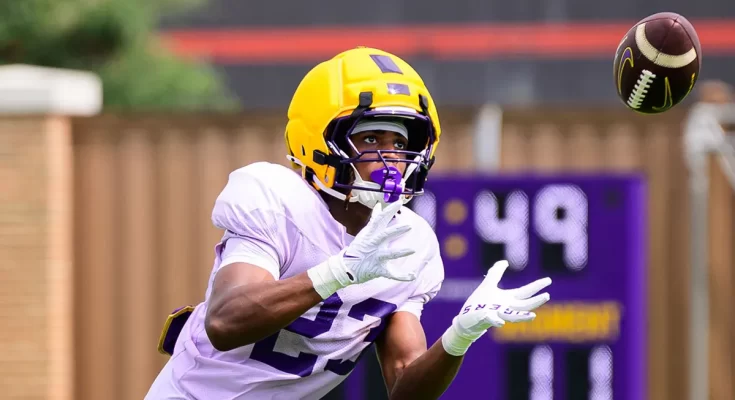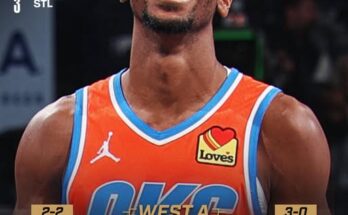J.T. Lindsey, a highly regarded freshman running back for the LSU Tigers, found himself at the center of a serious criminal investigation after turning himself in to law enforcement on Friday, August 8, 2025. Lindsey is facing two felony counts of accessory after the fact to second-degree murder following allegations that he provided shelter to two individuals wanted in connection with a homicide. Authorities allege that Lindsey knowingly allowed the suspects—Shemell Jacobs, 17, and Keldrick Jordan, 18—to stay in his on-campus residence at Louisiana State University for nearly two weeks. The two young men, both from Alexandria, Louisiana, are believed to have been on the run after allegedly killing 17-year-old Corey Brooks in May of this year. The homicide had prompted an intense manhunt by local and federal law enforcement, who warned that anyone found harboring the suspects would face prosecution.
According to an arrest warrant issued for Lindsey, Jacobs and Jordan were apprehended inside Lindsey’s dorm room at LSU on August 4 by U.S. Marshals. When investigators entered the room, they reportedly discovered multiple firearms, including AR-15 style rifles, a Glock handgun, and a Draco weapon. Authorities say that surveillance footage showed the suspects entering and exiting the building on multiple occasions during their stay, sometimes using Lindsey’s LSU identification card and personal PIN code. Law enforcement believes Lindsey gave them access to the dorm and possibly helped conceal their presence, knowing they were being sought for murder. This assertion is central to the charges filed against the 18-year-old football player, who had only recently begun his college career and was considered one of the most promising young athletes in the program.
Lindsey, a graduate of Alexandria High School, had known Jacobs and Jordan prior to enrolling at LSU. All three had ties to the same community, which is part of the reason prosecutors believe Lindsey’s actions may not have been coincidental or out of ignorance. According to the warrant, Lindsey was seen on video entering the dorm with the suspects as early as July 24, roughly eleven days before they were arrested. In the days following the arrest, police interviewed individuals connected to Lindsey, including one associate who claimed Lindsey had confided that he knew the two were wanted for murder. That statement became a key piece of evidence in the warrant issued against him, suggesting that Lindsey may have been fully aware of the risks and legal implications of allowing the men to stay with him.
Despite the allegations, Lindsey’s defense team has strongly denied any wrongdoing. His attorney, Kris Perret, issued a public statement asserting Lindsey’s innocence and stating that he was completely unaware the two individuals were wanted for any crime, let alone murder. According to Perret, Lindsey simply allowed old acquaintances from his hometown to stay with him briefly and had no idea of their criminal status. Perret added that his client is cooperating fully with law enforcement and is committed to clearing his name. The defense contends that Lindsey’s gesture was one of friendship, not criminal intent, and that he had no reason to suspect Jacobs and Jordan were fugitives. Furthermore, the defense has argued that possession of Lindsey’s ID and PIN code by one or both suspects does not necessarily imply that Lindsey willingly provided them, suggesting the information may have been used without Lindsey’s knowledge.
Upon surrendering to police, Lindsey was booked into East Baton Rouge Parish Prison, where he was processed and later released on a $5,000 bond that same evening. He has not made any public statements regarding the situation, and all communication has come through his legal counsel. The incident has caused an immediate impact on his athletic future as LSU suspended Lindsey from all team-related activities pending the outcome of the legal process. LSU issued a brief statement acknowledging the charges and emphasizing that it takes such matters seriously, but the university has otherwise declined to comment further, citing an ongoing investigation and the importance of allowing the legal system to run its course.
Head football coach Brian Kelly also addressed the incident during a press conference, using it as a cautionary tale for his players and student-athletes in general. Kelly emphasized the importance of maintaining a trustworthy and responsible inner circle, especially for young athletes who are adjusting to college life and the newfound attention that comes with being part of a major Division I football program. Kelly noted that many student-athletes are now involved in revenue-sharing and name, image, and likeness (NIL) deals, meaning they have resources and visibility that can attract the wrong kind of attention. He stressed that young players must be vigilant about who they allow into their lives and their living spaces. While he did not comment directly on Lindsey’s guilt or innocence, Kelly’s remarks made it clear that the program views the incident as a serious matter with long-term implications for the team’s culture and reputation.
Lindsey arrived at LSU with considerable hype, ranked among the top running backs in the 2025 national recruiting class. He was a standout athlete at Alexandria High School and had won several awards, including the prestigious Warrick Dunn Award, given to the top high school football player in Louisiana. Analysts praised his speed, agility, and vision on the field, and many believed he had the potential to earn playing time as a freshman, possibly even securing a starting role within a year or two. His arrest has now put all of that in jeopardy, as the program must wait for the legal process to unfold before making any decisions about his future.
The timing of the charges also comes just weeks before the start of the college football season, adding further complication to LSU’s preparations. While Lindsey was not yet a starting player, his presence added valuable depth to the running back position. The case also raises broader concerns about athlete conduct, dormitory security, and the challenges universities face in managing the off-field behavior of high-profile students. Questions are also being asked about how two murder suspects were able to stay undetected in an on-campus residence for nearly two weeks, despite LSU’s dorm policies and the presence of surveillance systems.
As for the two suspects, Jacobs and Jordan remain in custody and are facing charges in connection to the killing of Corey Brooks in Alexandria. Authorities allege that the two were involved in a targeted shooting that resulted in Brooks’s death, and the details of the crime are still under investigation. The Alexandria Police Department had issued statements prior to their capture warning the public not to assist the suspects in any way, suggesting that their efforts to locate Jacobs and Jordan were extensive and public. The fact that they were ultimately found in an LSU dormitory has shocked both the campus community and the broader public, and it has intensified the scrutiny on Lindsey’s role in the situation.
While some members of the public have rushed to judgment, others have urged patience and due process, noting that Lindsey is still a teenager and may have simply made a poor decision without fully understanding the consequences. His defenders argue that the pressures and responsibilities placed on young athletes are enormous and that this may have been a case of misplaced trust or loyalty rather than criminal intent. However, legal experts have pointed out that accessory charges are serious and can carry significant prison time if prosecutors can prove that Lindsey knowingly aided fugitives or attempted to conceal their presence from law enforcement.
The case is expected to proceed through the Louisiana court system over the coming months, and it will likely take time for the facts to be fully established. Lindsey’s legal team is reportedly preparing to challenge the arrest warrant’s claims, including the assertion from the associate who said Lindsey admitted knowing about the murder charges. They may also argue that any statements made by Lindsey to friends or acquaintances are hearsay and should not be admissible in court. Meanwhile, prosecutors are expected to focus on the surveillance footage, the use of Lindsey’s identification credentials, and the weapons found at the scene as evidence that he was more involved than he claims.
Regardless of the final outcome, the situation has already had a profound impact on Lindsey’s life and the early trajectory of his football career. What began as a promising start at a nationally recognized football program has quickly turned into a legal crisis with potentially life-altering consequences. His case will likely serve as a warning to other athletes about the importance of making wise decisions and the dangers of associating with the wrong people, especially when the stakes are so high. As the legal process plays out, both the LSU community and the college football world will be watching closely to see whether Lindsey can clear his name—or whether this incident marks the end of his time as a Tiger before it ever truly began.



